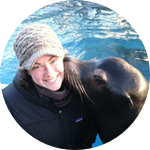Association of Zoos and Aquariums Grant Challenge
Categories

A remarkable amount of science happens in zoos and aquariums -- much of it right in front of peoples' eyes. Zoo and aquarium practice itself is science-based, and the zoo world is one where research findings are converted to practice surprisingly fast.
The Projects
Browse the participating projects
The role of facilitation in sparking curiosity and conservation intentions during up-close animal encounters
Many zoos offer opportunities for visitors to have up-close encounters with ambassador animals. These encounters...
Does increasing enrichment complexity for bears encourage them to work harder for their food?
Food abundance, delivery schedules, and other external factors affect animal behavior in zoos, especially...
More About This Challenge
The sciency details
Challenge Aims
A remarkable amount of science happens in zoos and aquariums – much of it right in front of peoples’ eyes. In 2017, AZA-accredited zoos and aquariums participated in nearly 1,300 different research projects, studying more than 450 species and subspecies. These projects resulted in more than 170 peer-reviewed publications, articles, and reports. Zoo and aquarium practice itself is science-based, and this world is one where research findings are converted to practice surprisingly fast. Many of these results can be found in Zoo Biology.
Zoo and aquarium science occurs in an open forum, where people can be easily engaged in the process and results, and converts to changes in management or animal care rapidly. Zoo and aquarium science tries to answer big picture questions often with limited resources, with goals as wide-ranging as bolstering endangered populations and understanding why species struggle to reproduce in the wild.
In collaboration with Experiment, the AZA Research and Technology Committee and Zoo Biology are calling for proposals for zoo and aquarium research grant challenge. Projects need to meet the AZA Research Priorities for mission-focused research.
Mission-focused research includes any project undertaken by or at an AZA-accredited institution or certified related facility that:
- Involves application of the scientific method: it is hypothesis- or question-driven, includes systematic data collection and analysis, and draws conclusions from the research process
- Is primarily focused on studying questions relevant to the conservation, animal care and welfare, science, or education missions of institutions
- Includes any of the following and occurs in the wild and/or in an individual institutional collection or across zoological facilities:
- Systematically-conducted surveys related to the above areas that are qualitatively or quantitatively analyzed
- Applied research that informs our understanding and management of animals, including reproduction, nutrition, epidemiology, sensory biology, physiology, population biology, behavior, welfare, etc.
- Basic research that focuses on increasing understanding of fundamental biological principles, including evolutionary biology, physiology, behavior, etc.
- Systematic analysis of studbook data or other zoological records to answer research questions (but not to prepare annual management plans)
- Research in conservation education, public engagement, or how guests use and view institutions
We will review proposals and plan to launch qualifying projects in the second week of January. Projects will have 30 days to fund-raise for set “all or nothing” goals. After three weeks of campaigning, the projects with the most backers will receive a bonus amount donated to their campaigns on top of their raised funds, runner-up campaigns will also receive additional funds. The AZA Research and Technology Committee will review all campaigns to make sure they meet their criteria, and will have final say over campaigns that join the challenge.
What to expect:
- Don't worry about the short call time as crowdfunding campaigns are quick and easy to prepare. It typically takes researchers about 2 hours from start to finish to get their campaign submitted. Experiment reviewers will then work with you to make your page as crowdfunding-friendly as possible.
- Crowdfunding works best with a strong outreach plan run by the researcher. Experiment staff will help you develop an outreach strategy that will meet your goals and get the world excited about your research.
- Not sure about this crowdfunding thing? Have a look at our crowdfunding basics and learn generally how Experiment works.
Learn more about the 2017 AZA research highlights here.
This challenge is generously sponsored by the Wiley journal, Zoo Biology, and the Association of Zoos and Aquariums.




 Challenge Grants
Challenge Grants